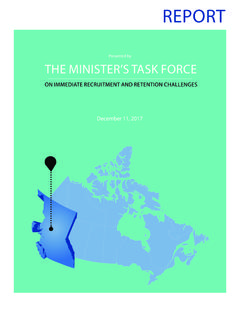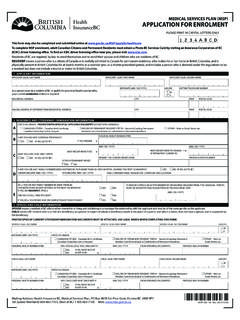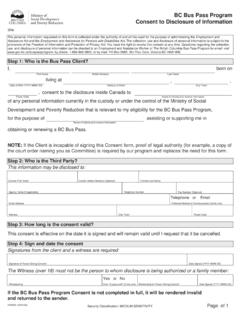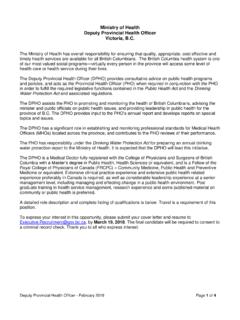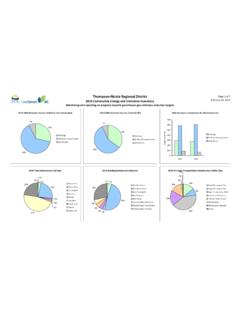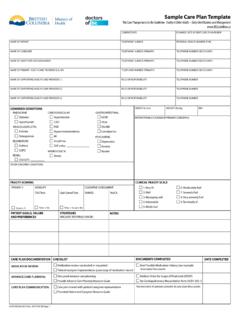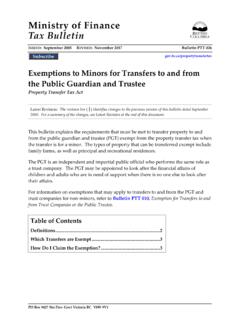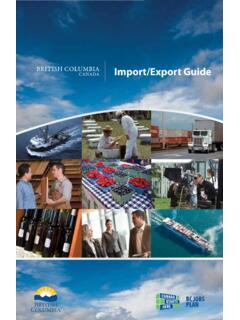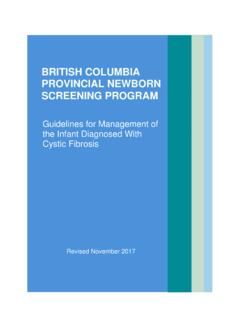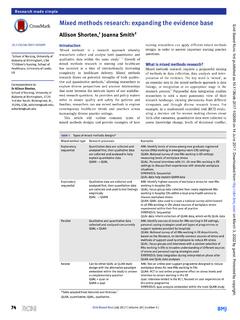Transcription of Key Principles and Strategies for K-12 Mental Health Promotion
1 Key Principles and Strategies for K-12 Mental Health Promotion in Schools 1 July 23, 2021 Key Principles and Strategies for K-12 Mental Health Promotion in Schools August 30, 2021 Key Principles and Strategies for K-12 Mental Health Promotion in Schools 2 Key Principles and Strategies for K-12 Mental Health Promotion in Schools Introduction The K-12 system continues to demonstrate great resilience, flexibility, and innovation to meet student, school, and community needs during the COVID-19 pandemic and response.
2 It is important to acknowledge the important roles of adults throughout the system in supporting students to process their COVID-19 experiences, and build resiliency, skills and knowledge that contribute to their overall well-being. This resource was developed as a supplement to the district-focused resources in the K-12 Recovery Plan to support district and school-based staff, families, and students as they prepare for the start of the 2021/22 school year. The return to school in the Fall provides opportunity for reconnection and a focus on holistic Health Promotion with intentional actions that address systemic inequities.
3 Objectives In partnership with the BC Centre for Disease Control (BCCDC), the Ministry of Education initiated a Mental Health School Start-up Working Group with membership from education, Mental and public Health , and government partners. This working group reviewed data and research (completed and in progress), on Mental Health impacts of COVID-19 and the pandemic response and literature on Mental Health Promotion to identify key Principles , Strategies , recommend actions, and resources to support school start-up 2021/22 and the recovery from the COVID-19 pandemic.
4 General information on Mental Health and specific information on the Mental Health impacts of COVID-19 is included at the end of this resource as background information. The document begins with Key Principles that expand on the elements of the Ministry s Mental Health in Schools Strategy and follows with Strategies , recommended actions, and resources to support Mental Health and well-being with a school-based focus. Please use discretion and professional judgement in applying Principles and Strategies that will most benefit your school communities, classrooms, students, colleagues, and yourselves.
5 Contents Introduction .. 2 Key Principles .. 3 Strategies .. 7 Background information .. 16 Policy Influences .. 17 Key Principles and Strategies for K-12 Mental Health Promotion in Schools 3 Key Principles The following four key Principles apply to all elements of the MHiS Strategy and are intended to provide a general framework for planning and implementing Fall 2021 school opening processes. Cultural Responsiveness and Humility Key Principle: Demonstrate cultural humility by reflecting on your own and systemic cultural biases when choosing actions/resources to support Mental Health as we return to our school communities in September.
6 Cultural humility is a process of self-reflection to help understand personal and systemically conditioned biases and to develop respectful processes and relationships. It involves humbly acknowledging oneself as a life-long learner when it comes to understanding another s experience. Cultural safety is about fostering a climate where Indigenous Peoples and peoples of all cultures are recognized, respected and reflected without discrimination. School connectedness is impacted by implicit bias and privilege, expectations, sense of belonging and identity, cultural relevance, Indigenous worldviews and perspectives, connection to communities, cultures of reflective practice, and many other factors.
7 Actions Resources Everyone: Practice awareness and sensitivity regarding the complex and devastating history that pandemics have had on many Indigenous communities. Make a personal commitment to cultural responsiveness and humility and set goals to stay accountable. Truth and Reconciliation Commission of Canada: Calls to Action First Nations Health Authority Cultural Safety and Humility Key Principles Cultural Responsiveness and Humility Proportionate Responses and Supports Trauma Informed Practices Strengths Based Approaches Cultural Responsiveness and Humility Proportionate Responses and Supports Trauma Informed Practices Strengths Based Approaches Mental Health IN SCHOOLS STRATEGY Compassionate Systems Leadership Compassionate Systems Leadership Adult Well-Being Capacity Building Mental Health Literacy
8 Social and Emotional Learning Resilience School Connectedness Play Mental Health in the Classroom Comprehensive School Health Core Competencies First Peoples Principles of Learning Physical and Health Education Curriculum Key Principles Strategies Key Principles and Strategies for K-12 Mental Health Promotion in Schools 4 Humbly acknowledge oneself as a learner when it comes to understanding another s experience of the COVID-19 pandemic. Engage in self-reflection to understand personal and systemic biases and to develop and maintain respectful processes and relationships.
9 Learn about and support Indigenous language revitalization in your community. Recognize and honour the traditional territories and communities among which you live, work, and those of your students. School and District Leadership: Actively participate in respectful engagement that recognizes and strives to address power imbalances inherent in the K-12 system. Establish structures and processes for shared decision making with Indigenous peoples. Consult with local First Nations to recognize and incorporate First Nations language of the land and culture into 2021-22 school ceremonies.
10 Consult with MNBC and local M tis Chartered Communities to incorporate M tis language and culture. Deliver ongoing authentic in-service and professional development for all school district staff that focuses on enhancing Indigenous student achievement as well as integrating Indigenous and culturally-specific world views and perspectives into learning environments. Educators: Participate and support student participation in First Nations and M tis community events. Equity in Action Project M tis Nation BC Health & Wellness Newsletter Nahanee Creative M tis-specific Gender Based Analysis Plus (GBA+) Tool Back to Top Proportionate Responses and Supports Key Principle: Use curiosity and inquiry to understand how others have experienced or felt in response to the COVID-19 pandemic, how they would describe their Mental Health , and what services and supports they need or want.
